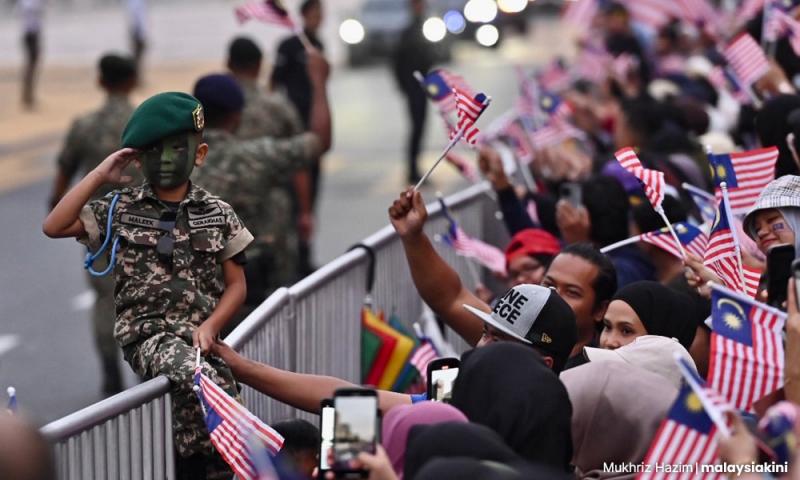LETTER | Are Malaysians patriotic?
LETTER | “Study shows Malaysians are very patriotic” was the headline of a report published by a newspaper on the eve of the 66th Malaysia Independence Day.
If so, it is wonderful for our beloved nation.
The finding was based on the feedback from 1,082 respondents from all major ethnic and age groups in Malaysia.
The survey was conducted in July 2023 and found an astonishingly high 99 percent level of patriotism.
After analysing the data, Prof Syed Arabi Idid from the International Islamic University Malaysia disclosed that extreme patriotism had always been the sentiment among Malaysians, as contained in the findings by Kajidata Research since 2013.
He said this level of pride was not seen in many nations, even in the United States where a Gallup poll in June 2023 showed that 67 per cent of Americans were either extremely or very proud to be an American.
He told Bernama, “The political divide in the country has very little bearing on Malaysians’ loyalty to their motherland, unlike in the US at present where the Gallup poll indicated that Republican supporters showed greater pride in their country than the rest.”
And I wish to share my two cents.
Ever since Malaya gained its independence on Aug 31, 1957, there had been much fervour in the air towards the end of August and onwards to mid-September after Malaysia was formed on Sept 16, 1963.
But not many Malaysians in peninsular Malaysia know that Sarawak gained its independence from Britain on July 22, 1963, and Sabah on Aug 31, 1963, before they joined Malaya to form Malaysia together with Singapore, but the island nation withdrew in early August 1965.
The most obvious remnant that Sarawak and Sabah were once separate countries is that they are allowed to control the entry of Malaysians from peninsular Malaysia into their respective territories, and those born in Sarawak need permission to enter Sabah, and vice versa.
Apart from not giving due recognition to Sarawak and Sabah, the greater tragedy is the poor understanding of loyalty and mistaking ugly nationalism as extreme patriotism.
This has resulted in primarily superficial displays of patriotism, especially in August and September.
Mercifully, the media no longer highlight comical characters decorating their bicycles, trishaws, motorcycles, cars and trucks with Jalur Gemilang and hail them as patriotic.
Many national flags are no longer used as ornamental pieces to wrap government buildings.
It is good to feel patriotic but nothing more than superficial sentiments if not translated into positive action.
In flag-raising ceremonies, enforcement officers may belt out the Negaraku with gusto, but they are far from being patriotic if they are corrupt or irresponsible.
In my book, the silent majority who study or work hard are productive and contribute to society are patriotic.
Those determined not to use government healthcare facilities by living a healthy lifestyle are more patriotic than those who fully pay licence fees and income taxes.
On the other hand, nationalism rears its ugly head when we are bent on putting other countries or nationalities down instead of raising our own.
It is the favourite ploy of selfish politicians to win votes and they could not care less even if it harms our country and citizens.
In contrast, patriots are universally admired by people everywhere as they bring real progress and development to their own nation and community without disparaging others.
This requires genuine patriotism, positive actions and honest hard work that most people would rather avoid.
In the same report, Kajidata Research’s adviser Haris Ismail noted that while the high level of acceptance of the Madani concept was good, more needed to be done by civil servants in delivering the pledges made under the framework.
He said the participation of the government machinery and state governments in implementing Madani policies was still lagging, adding that this had to be addressed to ensure that the Madani concept achieved its goals.
Are many civil servants dragging their feet to implement policies and instructions made by the government of the day?
If so, are they being patriotic?
How many were conscientious enough to resign from their iron rice bowls for disagreeing with a policy?
There has been much concern over the bloated service, with RM82 billion spent by Malaysian taxpayers in 2020 to keep civil servants on the job and another RM27.1 billion for those who retired.
But politicians from both sides of the political divide would not dare to suggest trimming the 1.6 million workforce as the size of this vote bank is considerable.
Will there be any civil servants with integrity rising to become great patriots just like many had done in the past?
In January, Prime Minister Anwar Ibrahim said our national debt including liabilities has reached RM1.5 trillion and should be addressed urgently, as this was already more than 80 percent of the country’s GDP.
If left unchecked, our country is undoubtedly heading for the cliff.
We need real patriots to emerge and fight this clear and present danger, not imaginary enemies espoused by selfish politicians bent on stirring racial and religious sentiments, damaging the economy even further.
Although I am not an academic, I am clear about who the real patriots and traitors are. And I wish more Malaysians could be genuinely patriotic for the good of our own country and people.
If not, Malaysia could be a paradise lost and little would change from syiok sendiri findings.
The views expressed here are those of the author/contributor and do not necessarily represent the views of Malaysiakini.
RM12.50 / month
- Unlimited access to award-winning journalism
- Comment and share your opinions on all our articles
- Gift interesting stories to your friends
- Tax deductable
